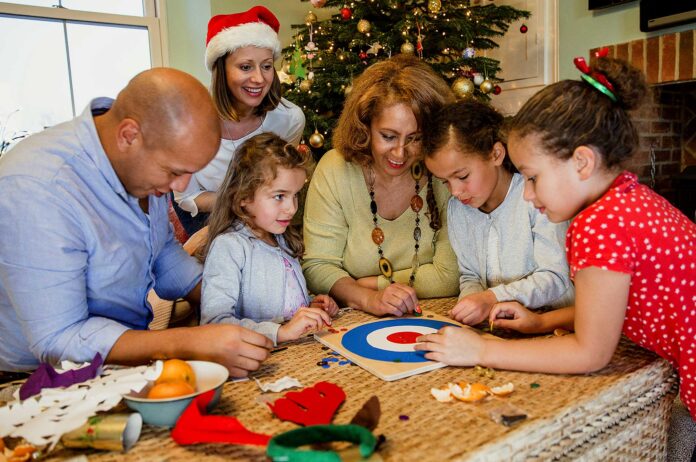‘Tis the Season… To Practice Joyful Parenting!
Parenting isn’t always a joy- and that is perfectly okay. However, aiming to add a little more joy to the parenting process, especially this time of year when spirits (and stress levels) are high, is a gift any parent can give themselves and their family. Although it can be hard to take play seriously as an adult, the therapeutic powers of play have been well-studied and documented. The Association for Play Therapy describes play as having the ability to facilitate communication, foster emotional wellness, enhance social relationships, and increase personal strengths (Schefer & Drewes, 2014). Landreth (2012) describes play as the child’s way of communicating, processing novel experiences, and building new skills/problem-solving. Additionally, play can be used to externalize big feelings and allow kids the freedom to engage in potentially difficult topics from a safe, therapeutic distance (Schefer & Drewes, 2014). In the “Interpersonal Neurobiology of Play” (2014), Kestley details the benefit of play in helping children regulate their nervous system, reduce stress, and build qualities of resilience.
Play is some serious stuff, and you don’t have to be a play therapist to access its benefits. Here are a few examples of ways to incorporate play into your everyday parenting. And as always, speaking with a licensed mental health professional could be a great way to find out which interventions could be best suited for your child and family.
1. Tame the monster
“Name it to tame it” is a slogan that comes from “The Whole Brain Child” (Siegel & Bryson, 2001), and describes the regulating effect of putting feelings into words to help calm big emotions. To make this concept more accessible and non-threatening for small children, try to help your child think of their temper or anxiety as something separate from them, like a monster, and give it a name. What does their “anger monster” or “worry monster” look or sound like? Does it try to convince them of things that aren’t always helpful or true? Does it try to get us to do things they feel bad about later? As an example, maybe your child names feelings of irritability as Grumpy Lumpy – The Bad Mood Monster. The next time they’re cranky or irritable you could say, “Uh oh, I think I hear Grumpy Lumpy talking. How can I help you?” Externalizing difficult feelings will help you be able to work together as a team and problem-solve ways to cope with a surprise visit from unwanted guests like Grumpy Lumpy.
2. Playful touch
Emotions occur primarily in our bodies as our nervous systems turn stress on and off in response to (real or perceived) threats. Having a repertoire of regulating physical touch activities is a great way to co-regulate with your child. For example, giving your child a good, old-fashioned bear squeeze can help promote feelings of calm and help foster healthy attachment. This can be modified at night time into a taco tuck or burrito roll, which is a playful way to tuck kids into bed at night, in a way that helps them feel safe and secure. The playful aspect of these interventions can also help kids reduce stress (Kestley, 2014). Brushing your child’s hair, or drawing on their back and having them guess what you’re drawing, are other techniques that could easily be integrated into family movie night, or any other natural period of downtime.
3. Harness the power of games
The next time kids are struggling to follow adult requests and you’re on the brink of losing your cool, see if there’s a way to turn the direction or expectation into a game. Simply timing your child to see how fast they can run to the bathroom to brush their teeth, or seeing what kinds of animals they can impersonate and do a silly walk to the bathroom, can reduce power struggles and improve compliance. If kids consistently struggle with listening, having some sort of code word or clapping sequence that they have to repeat back can be a simple and playful way to get their attention. Games are not only fun but can also help kids build important social and emotion regulation skills. For example, board games such as Chutes and Ladders can help kids get more comfortable following rules and structure, and games such as Simon Says can help improve listening skills (Yeager & Yeager, 2016).
4. Use toys to talk
It can be difficult for kids to process and express how they’re feeling when big life events occur, such as a death, moving, or a natural disaster. Using toys like puppets, dolls, and action figures can make broaching these difficult subjects much more accessible. Even though it might feel awkward or silly at first, adults can play a big part in this process. For example, if a kiddo is struggling to talk about how they’re feeling, they might be more open to talking to a stuffed animal or puppet. A conversation about the difficult topic at hand might more readily take place between two toys instead of between you and your child. I suggest parents have their own stuffed animal or puppet so they can meet their child on their level and join in, or facilitate, the conversation.
References:
Kestley, T. A. (2014). The interpersonal neurobiology of play: brain building interventions for emotional well-being (1st ed.). W. W. Norton & Company.
Landreth, G. (2012). Play therapy: the art of the relationship (3rd ed.). Routledge Publishing.
Schaefer, C. E., & Drewes, A. A. (Eds.), (2014). The therapeutic powers of play: 20 core agents of change (2nd ed.). Hoboken, NJ: Wiley.
Sigel, D. J. & Bryson, T. P. (2001). The whole brain child: 12 revolutionary strategies to nurture your child’s developing mind. Bantam Publishing.
Yeager, D. & Yeager, M. (2016). Simon says pay attention: help for kids with ADHD. Golden Path Games.





















